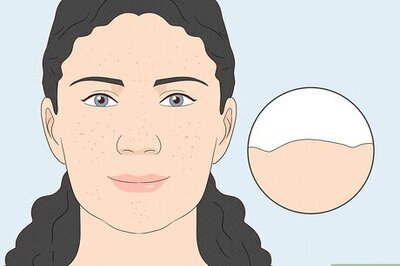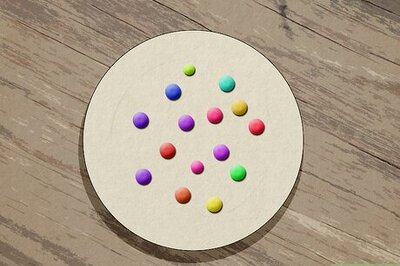
views
In this article, we will provide insights about Chlamydia, shedding light on its transmission, symptoms and available treatments & prevention options.
Chlamydia is the most common STD, and many people who have it don’t even realise it. Chlamydia is a sexually transmitted infection caused by bacteria called Chlamydia trachomatis. It’s a very common STD, especially among young people, but the good news is it’s easily treated. If left untreated, chlamydia can lead to more serious health issues like pelvic inflammatory disease (PID), infertility, and ectopic pregnancy.
How is Chlamydia Spread Between Partners?
Chlamydia is passed between sexual partners through unprotected vaginal, anal, and oral sex. This common STD spreads easily during unprotected sex because the bacteria can live in the vagina, penis, mouth, and anus. The bacteria are transmitted through direct contact with infected genital fluids (semen or vaginal fluids). You can get chlamydia by having vaginal, anal, or oral sex with someone who has chlamydia.
It can also spread from an infected pregnant woman to her baby during childbirth. Newborn babies who are exposed to the bacteria during delivery can develop eye infections and pneumonia. Even if you don’t ejaculate during sex, you can still get chlamydia or pass it on to your partner. All it takes is contact with infected fluids like pre-ejaculate or vaginal secretions. Chlamydia can be transmitted through direct contact even if there is no penetration.
The more sexual partners you have, the greater your risk of getting chlamydia. However, even people with only one-lifetime sex partner can get chlamydia. The bacteria can live in the reproductive tract without causing symptoms, so your partner may not know they have it. The only way to know for sure is for you and your partner(s) to get tested.
Symptoms of Chlamydia in Women and Men
Common symptoms of chlamydia in women include:
• Unusual Vaginal Discharge: Chlamydia can cause an increase in vaginal discharge that may have a strong smell. The discharge is often yellow or green.
• Bleeding between periods: Chlamydia can also lead to bleeding between menstrual periods or after sex.
• Pain during sex: Chlamydia frequently causes pain, discomfort, or bleeding during or after sexual intercourse.
• Lower abdominal pain: Chlamydia may lead to pain in the lower abdomen, especially during sex. The pain is sometimes dull and persistent.
• Painful urination: Chlamydia can make urinating painful or uncomfortable due to inflammation of the urethra.
In men, common chlamydia symptoms include:
• Discharge from the penis: Chlamydia commonly causes a discharge from the penis that is thin and watery or thick and yellow/green.
• Pain or discomfort while urinating: Chlamydia frequently leads to a stinging or burning sensation while urinating due to inflammation of the urethra.
• Swollen or tender testicles: Chlamydia can cause one or both testicles to become swollen, red, or tender to the touch.
• Rectal pain, bleeding, or discharge: For those who engage in receptive anal sex, chlamydia symptoms may include rectal pain, bleeding, or a discharge of pus.
Many people with chlamydia show no symptoms at all. The only way to know for sure if you have chlamydia is to get tested.
Treatment Options if You Test Positive for Chlamydia
If you test positive for chlamydia, don’t worry—it’s easily treatable. Since it’s bacterial in nature, antibiotics can easily cure it.
1. Antibiotics: The most common way to treat chlamydia is with an antibiotic, usually azithromycin or doxycycline. Azithromycin is typically given as a single dose, while doxycycline requires taking pills for 7 to 14 days. Antibiotics are very effective at eliminating the chlamydia bacteria. Be sure to take the full course of medication as prescribed to cure the infection.
2. Alternative remedies: Some people prefer to try alternative remedies before resorting to antibiotics. Options include:
• Herbal medicines like astragalus, goldenseal, and oregano oil which may have antibacterial effects. However, there is little evidence they can cure a chlamydia infection on their own.
• Probiotics and yoghurt contain good bacteria that can help support your reproductive health and natural defences. They may provide some relief from symptoms but should not replace medical treatment.
• Essential oils like tea tree oil, lavender oil, and chamomile oil can reduce inflammation, ease discomfort, and may have mild antibacterial properties. Apply diluted oils externally or in a warm bath, but talk to your doctor before ingesting essential oils.
During the treatment time, it’s important not to have sex. It’s still possible to transmit and contract chlamydia if exposed again, even if you’ve been treated for a previous infection.
How can you prevent chlamydia?
The only guaranteed way to avoid chlamydia is to avoid sexual activity. However, if you are sexually active, there are several simple steps you can take to reduce your risk of contracting chlamydia and other STIs.
• Use protection when you have sex.
• For oral sex or vagina-to-vagina contact, use dental dams.
• Stick to one partner who only has sex with you.
• Get tested regularly for infections.
• If sharing sex toys, clean them after each use.
So, if you’ve been experiencing unusual pain, discharge, or discomfort in your private parts, don’t ignore it. Both women and men can get tested with a urine sample or vaginal/rectal swab. If diagnosed and treated early, chlamydia is curable with a short course of antibiotics. However, if left untreated it can lead to infertility and other health issues. You owe it to yourself and your partners to know your status and take care of your health. Chlamydia is nothing to mess around with, but the good news is with early diagnosis and treatment you can say those painful symptoms goodbye and get back to living your best, healthiest life.




















Comments
0 comment